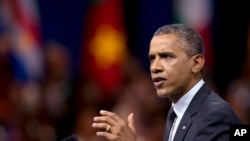The U.S-Africa leaders’ summit, which started in Washington Monday, entered its second day Tuesday with focus now on the US-Africa business forum.
But ebola, the virus ravaging some West African states, is casting a shadow over the historic event.
The nearly 50-African leaders in Washington, hope the summit will bolster trade between the two continents, to the level of China, who’s trade and investment volume stands at $200 million, compared to the US’s $85 million.
United States President Barack Obama will address the visiting Heads of State Tuesday, following their long day meetings with business executives from America and Africa, where many hope to strike deals.
There’s little hope for any major deals for Zimbabwe, however, as President Robert Mugabe, was not invited to the summit, together with leaders of Eritrea, Sudan and Central African Republic, for their alleged human rights abuses.
Godfrey Kanyenze, director of the Labour and Economic Development Research Institute of Zimbabwe, says President Mugabe’s exclusion dashes hopes to improve the country’s worsening economy.
Economists, industrialists and labour experts are warning of a troubled 2014 for Zimbabwe, as many companies slip into liquidation or judicial management, pushing the official unemployment rate to close to 90 percent.
But Resource Exploitation Watch chief, Washington Mehlomakhuku, says the summit offered no solution for Zimbabwe.
Zimbabwe’s deputy Foreign Affairs Minister Chris Mutsvagwa said by excluding Zimbabwe, America was using its super power status to sabotage Harare.
But former Zimbabwe diplomat to Ethiopia and international relations expert Clifford Mashiri, based in London, dismissed Mutsvangwa’s remarks saying Zimbabwe must look itself in the mirror and reform.
The crucial meetings in Washington, are taking place in the backdrop of a looming threat of the spread of the ebola virus in West Africa, with the epicentre being Guinea.
According to the World Health Organization, close to 1,000 people have died from the virus, and an estimated 1,603 people are affected, Presidents of Liberia and Sierra Leone, which account for close to half the total number of deaths from the disease's latest outbreak, declined the invitation to the summit, to attend to the crisis.
African leaders have found themselves addressing the crisis at the summit, including South African President Jacob Zuma who told participants on the sidelines of the summit that his country is helping affected nations tackle the virus.
United States officials have also committed to help.
A statement issued by the U.S. State Department Monday, said U.S. Secretary of Health and Human Services Sylvia Mathews Burwell, and Centers for Disease Control and Prevention director Dr. Tom Frieden, met with the President Alpha Condé of Guinea , and senior officials from Liberia and Sierra Leone about the outbreak.
The statements said; “The group identified national and regional priorities and held intensive discussions on the types of assistance needed to mount an effective response”.
Secretary Burwell and director Frieden reiterated U.S. engagement and support for efforts to control the outbreak and address the challenge.
The discussions took place on the margins of the U.S.-African leaders’ summit now taking place in Washington.
The historic summit is the first of its kind featuring African leaders and an incumbent United States of America President.




